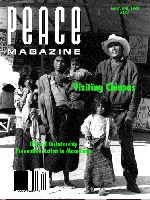
Peace Magazine May-June 1998, page 5. Some rights reserved.
Search for other articles by various here
Thank you for your wonderful interview with Palden Gyatso in the March/April issue of Peace. More Canadians should be exposed to the sad events that have been taking place in Tibet. Your article and one published in the March/ April issue of Toward Free- dom Magazine will go far in exposing the horrors that the government of China have committed in Tibet. It is especially sad that women, young and old, have been tortured and killed. Many of them have been Tibetan nuns. It is with great shame that I read of the acts of our Canadian officials at the APEC conference, removing the Tibetan flag so as not to offend the officials from China. Apparently we were worried about possible loss of business. Have we all forgotten the Nazis and World War II? Countries turned away from the human rights violations of Jews and Gypsies by the Germans. After the war it was said that "never again" would we allow such things to happen. Yet we have - in Tibet, East Timor and other places. Enough! I want our country to have a social conscience and return to the activism of people like Lester B. Pearson. I want my country to return to its leadership in human rights and its activism for the people being ill-treated. Tibet would be an area for us to start. Our foreign minister and prime minister should meet with Palden Gyatso and apologize for the events in Vancouver. He would make them understand the genocide that is going on in Tibet.
Rick Palmer
Sault Ste. Marie, Ontario
Your editorial calling for an international rule of law (Mar 1998) hit the nail on the head to suggest that all countries possessing weapons of mass destruction "be held to the same standards and monitored by UNSCOM" and that miscreants be referred to the International [Criminal Court].
Your interview with Tim Trevan on "Saddam's Secret Weapons" in the same issue, however, raises some questions. Trevan seems to take the moral high ground when he says that because the allies do not know where Iraq's weapons of mass destruction are, any bombing that might hit them "would be purely accidental." That may be the case today, but according to the U.S. Air Force's own report, "Decisive Force: Strategic Bombing in the Gulf War," included in Gen.Schwarzkopf's military objectives in the first days of the war was the destruction of Iraq's "known nuclear, biological, and chemical production, storage, and delivery capabilities." Covering Schwarzkopf's military briefing on January 31, 1991, The New York Times reported that 28 chemical and biological weapons sites in Iraq had been bombed. This information seems to have disappeared into history's black hole.
Trevan seems to minimize the consequences of hitting stockpiles of weapons of mass destruction - "there may be contamination but it's not going to be disastrous." One may wonder, then, why the U.S. Army would bother to build a $650 million specially designed incinerator in Tooele, Utah, to dispose of its own 27 million pounds of chemical and biological agents stored there (representing only 42% of the total stored at seven other sites in the U.S.) The incinerator, incidentally, has been shut down because of safety issues. Utahans, it is safe to guess, would not like the idea of destroying those stockpiles by bombing or detonation.
Suzy Kane
Bedford Hills, N.Y.
The last major article in the March/ April issue on Gandhian economics by Hanna Newcombe deserves greater priority because of the danger to peace caused by the widening gap between rich and poor everywhere.
Capitalist economics is failing the increasing number of unemployed and under-employed. It appears to be shrinking the middle class, certainly in North America. It is forcing more people into debt.
Peace activists must give greater debate to determine the proper mix between technology-intensive and labor-intensive production. As Newcombe asks, what is the benefit of being on the cutting edge of technology if it increases human misery?
Ross Smyth
Montréal, Québec

Peace Magazine May-June 1998, page 5. Some rights reserved.
Search for other articles by various here